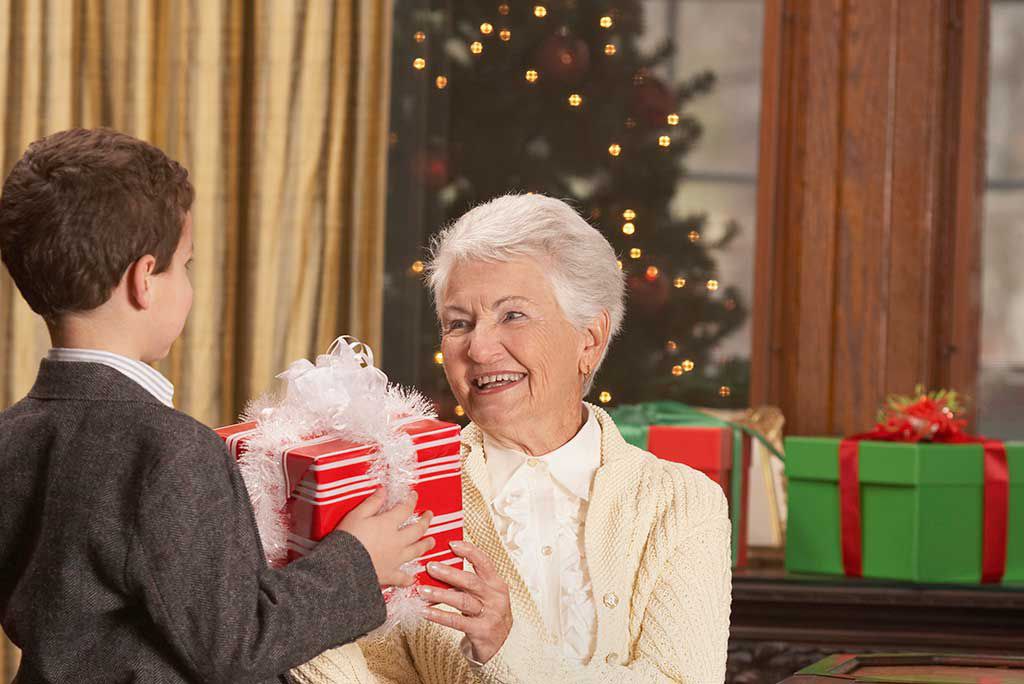
Celebrating the Holidays Safely with Senior Loved Ones
Health & Aging | Caregiver Support
Updated from the original publication on December 22, 2015.
Updated November 2024
The holidays are fast approaching! Your To-do list includes shopping, baking, wrapping, and other seasonal preparations. But for caregivers with an aging parent or anyone entertaining elderly loved ones this holiday, there's one more item for your list: Safety Checks!
It may seem like just one more item for your To-do list, but with the suggestions below, it is easier to keep your elderly loved ones safe this holiday season.
Making Your Home Safe for the Holidays
Before your holiday guests arrive, whether for the day or the week, here are a few things to check around the house for safety first.
- Clear front steps, walkways, and driveways of snow to avoid slipping hazards. Keep an eye out for snow and ice-covered surfaces before and during your holiday event. Take turns with a spouse or recruit the help of other family members so you too can enjoy time spent with holiday guests.
- Think carefully before lighting candles around the house. While you may enjoy the sweet smells of the holidays, December is the peak time of year for candle fires. But did you know more than 56% of home candle fires occur when they are placed too close to another object? Be careful where you set these aromatic accents. Make sure to avoid setting them in high-traffic areas. An even safer option is to use scented, flameless candles and fragrances as an alternative.
- Never leave food unattended while cooking.
 It can be lonely cooking over a hot stove while your guests are in another room having all the fun. As tempting as it may be to step away and visit with them for a while, leaving food unattended on the stove can be dangerous. According to the National Fire Protection Association (NFPA), unattended cooking is the leading cause of home fires. If you must leave, turn off individual burners. Fire prevention experts also suggest checking food in the oven every 15 minutes. Finally, don't forget to turn handles inward, away from the front of the stove where the elderly or little hands can easily grab a hold of them.
It can be lonely cooking over a hot stove while your guests are in another room having all the fun. As tempting as it may be to step away and visit with them for a while, leaving food unattended on the stove can be dangerous. According to the National Fire Protection Association (NFPA), unattended cooking is the leading cause of home fires. If you must leave, turn off individual burners. Fire prevention experts also suggest checking food in the oven every 15 minutes. Finally, don't forget to turn handles inward, away from the front of the stove where the elderly or little hands can easily grab a hold of them.
Transporting Your Loved Ones Over the Holidays
In all the hustle and bustle of the season, don't forget about safety and the transportation needs of your aging loved ones. For seniors traveling long distances, there are a few questions you may want to ask.
- How will my aging loved one arrive? Is your loved one able to drive alone? In some instances, flying is better, especially for older adults with vision problems. As an advantage, seniors who fly may board before other passengers, allowing them extra time to settle in. Other flight accommodations include wheelchair services and boarding assistance.
- Can my aging loved one travel alone or should I hire a travel companion? Some aging adults should not travel on their own due to medical reasons. Travel assistance provides your elderly loved one with personal support from a trained medical professional in case of an emergency. Travel companion programs can accommodate a wide variety of care needs. It's important to do your research before hiring a travel companion for your aging loved one. Along with companionship for the journey, travel companions can assist with airport check-in and ticketing, medication reminders, ground transportation, and more. Consider checking with your loved one's primary care physician for a referral.
- What other barriers may prevent my aging loved one from traveling? The most common barrier for elderly travelers is fear of the unfamiliar. If your loved one hasn't traveled recently they may not know what to expect. Clearly explain what they can expect during the trip and when they will arrive at your house for the holidays. Being removed from their surroundings can be a bit unnerving for older adults. Suggest they carry a sentimental item to help to alleviate the anxiousness of the unknown.
Whatever the travel barriers, it is important to identify them early so you have plenty of time to work through them with your loved one.
Engaging Aging Adults with Holiday Activities
Once you are sure your loved ones will have a safe visit, don't forget to consider guests of all ages when planning the holiday activities. The holidays are a great time for intergenerational learning, mingling, and fun, making sure everyone enjoys their time is important.
- No holiday gathering is complete without board games. Look for basic games for all ages. Games like Candyland, Sorry, and Monopoly are sure to bring out the kid in everyone.

- Enjoy Holiday Movies. Consider planning a cozy movie night featuring classic holiday films — especially your loved one's favorites, or those from their childhood. It's also fun to introduce them to "new" classics that other generations love. Popcorn, warm blankets, low-alcohol or mock cocktails, and a selection of heartwarming movies can make for a delightful evening.
- Don't forget the family photos. Everyone loves stepping back in time and sharing memories. Reminiscing is also a great activity for aging adults, especially those with dementia and memory loss. It's been proven to increase well-being and serves as a great tool for bringing the generations together. “Each time an individual tells part of his/her life story, those who listen are like a mirror, reflecting and affirming their lives,” says John Kunz, Founder, International Institute of Reminiscence and Review.
For more helpful tips, check out the resources section of our website.
More Resources
About Presbyterian Senior Living
As the trusted leader in aging services, Presbyterian Senior Living combines over 95 years of experience with innovative approaches to senior communities and services. Across our 27 communities in PA, MD, OH, and DE, we serve over 6,500 seniors. We are committed to: FOSTERING teamwork and responsibility. UPHOLDING integrity in every action. EMBRACING innovation to create opportunities for everyone’s success. LEADING with compassion and respect.


